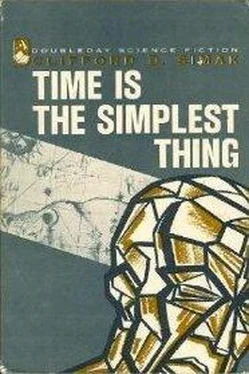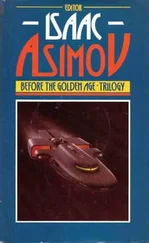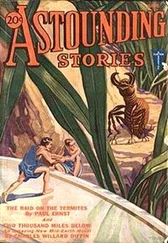“Well, you could,” said Harriet.
“I couldn’t stomach it. Besides, I made a promise. I told Godfrey I was with him. And I don’t like the way that things are going. I don’t like people taking me out to hang me because I am a parry. I don’t like some of the things I saw along the road and—”
“You’re bitter,” she said. “You have a right to be.”
“And you?”
“Not bitter. Just scared. Scared down to the marrow.”
You scared! A tough newspaper gal. . . .
He turned toward her, remembering something — the place where the old blind woman sold the roses. That night, he had seen the mask slip from Harriet Quimby and this was the second time.
Her face told him the truth — the tough newspaper gal also, at times, could be a frightened woman.
He half lifted his arms, and she crossed the little space between them. He held her close against him, and she was soft and pliant, not hard, not made of steely purpose, but very human flesh.
It’ll be all right, he said. Everything will be all right. And wondered at the sudden tenderness and protectiveness he felt, which certainly was alien in any relation he might have with this girl within his arms.
But the truck is wrecked and the trucker’s dead and the police, or maybe even Finn, have the star machine. And now Godfrey’s lying dead and the police are coming . . .
We’ll lick them all, he told her. There’s nothing that can stop us. . . .
A siren sounded from far off, a wail torn by the prairie wind.
She sprang away from him. “Shep, they’re coming!”
“The back door!” Blaine said, quickly. “Run toward the river. We’ll get down into the breaks.”
He sprang toward the door, and as his fingers found the bolt, there was a tapping on it.
He threw back the bolt and jerked open the door and standing in the fan of light that came pouring from the room was Anita Andrews and back of her other youthful faces.
“Just in time,” said Blaine.
’This body?”
“Over there,” he said.
They came in with a rush.
The siren was much closer.
“He was a friend of ours,” said Harriet, uncertainly. “This seems a dreadful way—”
“Miss,” Anita said, “well take care of him. We’ll give him every honor. . . .”
The siren was a steady howl that seemed to fill the room. Quick! Anita said. Fly low. You don’t want to silhouette against the sky.
Even as she spoke the room was emptying and there was no body on the floor.
She hesitated for a moment, looking at the two of them.
Someday you’ll tell me what this is all about?
Someday, said Blaine. And thanks.
Any time, she said. We parries stick together. We have to stick together. They’ll smash us if we don’t.
She swung toward Blaine, and he felt the touch of her, mind against mind, and there was suddenly the sense of fireflies in the evening dusk and the smell of lilacs drifting in the softness of a river fog.
Then she was gone and the door was closing and someone was hammering at the front.
Sit down, Blaine said to Harriet. Act as naturally as you can. Unconcerned. Relaxed. We were just sitting here and talking. Godfrey had been with us, but he went into town. Someone came and he rode into town with them. We don’t know who it was. He should be back in an hour or two.
Check, said Harriet.
She sat down in a chair and folded her hands in her lap sedately.
Blaine went to the door to let in the law.
Belmont was beginning to close up. All the houses, as they drove past, had been tightly shuttered, and in the business district, as they drove into it, the shop lights were going out.
Up the street a block or two, the marquee of the hotel still gleamed brightly in the dusk and just this side of it was a flashing sign that proclaimed the Wild West Bar still was willing to take on a customer.
“I don’t think,” said Harriet, “that we fooled those police too much.”
Blaine agreed. “Maybe not. But we had them stopped. There was nothing they could find.”
“I thought for a while they would pull us in.”
“So did I. But you sat there making gentle fun of them. That was hard to take. They were glad to get away. They must have felt like fools.”
He motioned at the flashing bar sign. “Maybe we should start with that.”
“As good a place as any. Likewise, about the only place there is.”
The bar was empty when they came into the place. The bartender had an elbow propped and was idly dabbing with a cloth at imaginary wet spots.
Blaine and Harriet hoisted themselves onto stools opposite the man.
“What’ll it be?” he demanded of them.
They told him.
He got glasses and reached for bottles.
“Little slow tonight,” said Blaine.
“Almost closing time,” said the man. “They don’t stick around. Soon as it gets dark folks get under cover. Everyone in this town.”
“Bad town?”
“No, not especially. It’s the curfew law. This place has got a tough one. Patrols all over the place and them cops are tough. They really make it stick.”
“How about yourself?” asked Harriet.
“Oh, I am all right, miss. The boys, they know me. They know the circumstances. They know I got to stick around just in case a late customer, like you, drops in. From the hotel mostly. They know I got to get the place tucked in and turn out the lights. They give me extra minutes.”
“Sounds tough, all right,” said Blaine.
The barkeep wagged his head. “For your own protection, mister. Folks ain’t got no sense. If it wasn’t for the curfew, they’d stay out to all hours where anything could get them.”
He stopped what he was doing.
“I just happened to think,” he announced. “I got something new. You might like to try it.”
“Like what?” asked Harriet.
He reached back and got the bottle, held it up to show them.
“Something new,” he said. “Straight out of Fishhook. They picked it up some outlandish place. Sap of a tree or something. Probably loaded with a lot of hydrocarbons. I got a couple of bottles off the factor at the Trading Post. Just to try, you know. Thought there might be some folks who might like it.”
Blaine shook his head. “Not for me. God knows what is in it.”
“Me, neither,” said Harriet.
The barkeep set the bottle back regretfully.
“I don’t blame you folks,” he said, giving them the drinks he’d made. “I took a nip of it myself. Just to test it out, you see, because I’m no drinking man.
“Not,” he added, quickly and parenthetically, “that I have anything against it.”
“Of course not,” Harriet sympathized.
“It was funny tasting stuff,” he said. “Not bad, you know. Not good, either. Had a musty tang. You might get to like it if you had a drink or two.”
He stood in silence for a moment, with his hands planted solidly on the bar.
“You know what I been thinking?” he demanded.
“Not the least,” said Harriet.
“I been wondering all this afternoon if that factor down at the Trading Post concocted that stuff up himself. Just as a sort of stinking joke, you see.”
“Oh, he wouldn’t dare.”
“Well, I imagine you are right, miss. But all of them factors are funny sorts of jerks. Folks don’t have much to do with them — socially, at least — but even so they manage to know more of what is going on than anyone in town. They must be listening all the time, for they have all the latest gossip.
“And,” said the barkeep, laying emphasis upon this horrid crime and this social failing, “they don’t never tell you nothing.”
Читать дальше








